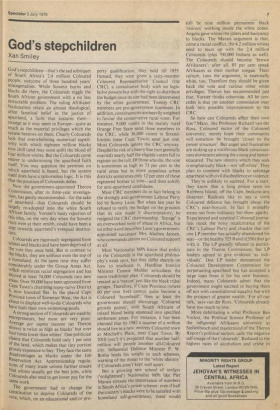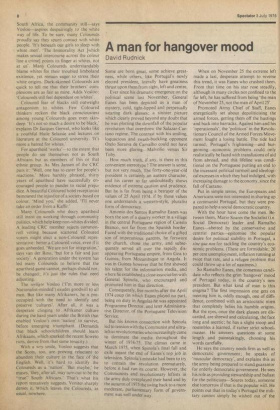God's stepchildren
Xan Smiley
God's stepchildren—that's the sad sobriquet of South Africa's 2.4 million Coloured People, outcome of three hundred years' miscegenation. While Soweto burns and blacks die there, the Coloureds niggle the South African government with a no less intractable problem. The ruling Afrikaner Nationalists retain an almost theological, often fanatical belief in the justice of apartheid, a faith that sustains them_ strange as it may seem in Europe--quite as much as the material privileges which the System bestows on them. Clearly Coloureds lack that overwhelming numerical superiority with which eighteen million blacks now chill (and may soon spill) the blood of four million whites. But the Coloureds come nearer to undermining the apartheid faith itself. You may question the premises on Which apartheid is based, but the system itself does have a remorseless logic. It is this that the position of Coloureds defies.
Now the government-appointed Theron Commission, after its three-year investigation, has gently recommended—for the sake of apartheid—that Coloureds should be largely re-adopted into the white South African family. Vorster's hasty rejection of this idea, on the very day when the Soweto riots were at their zenith, could have been a step towarsds apartheid's eventual destruc
tion.
Coloureds are rigorously segregated from Whites and blacks and have been deprived of the vote they once held. But in contrast to the blacks, they are without even the sop of a homeland. At the same time they suffer considerably under the Group Areas Act, whIch reinforces racial segregation and has shoved at least 74,000 Coloureds into new areas. Over 30,000 have been uprooted from Cape Town's charming topsy-turvy District 6, now knocked flat. In the placid Cape Province town of Somerset West, the Act is about to displace well-to-do Coloureds who have built their own swimming-pools. A strong section of Coloureds are wealthy entrepreneurs, but most are very poor. Average per capita income (as Theron shovvs) is twice as high as blacks' but over four times lower than whites'. One politician claims that Coloureds holcjonly 1 per cent of the land, which makes that tiny portion grossly expensive to buy. They face the same disadvantages as blacks under the Job Reservation Act. Apprenticeship regulations of many trade unions further ensure that whites usually get the best jobs, while Coloureds also tend to get lower pay for the same work.
The government had to change the constitution to deprive Coloureds of the vote, which, on an educational and/or pro
perty qualification, they held till 1955. Instead, they were given a sixty-member Coloured Representative Council (the CRC), a consultative body with no legislative powers but with the right to distribute the budget once its size had been determined by the white government. Twenty CRC members are pro-government nominees. In addition, constituencies are heavily weighted to favour the conservative rural voter. For instance, 9,000 voters in the mainly rural Orange Free State send three members to the CRC, while 36,000 voters in Strandfontein (near Cape Town) send just one. Most Coloureds ignore the CRC anyway. Despite the risk of a heavy fine (not generally exacted) nearly half the eligible voters fail to register on the roll. Of those who do, the vote is sometimes as high as 73 per cent in the rural areas but in more populous urban. districts sometimes only 12 per cent of those registered bother to vote—and then solidly for anti-apartheid candidates.
Most CRC members do in fact belong to the strongly anti-government Labour Party led by Sonny Leon. But when last year he refused to ratify the budget on the grounds that its size made it discriminatory, he resigned the CRC chairmanship. 'Stooge' is an overworked term of abuse in Africa, but no other word describes Leon's governmentappointed successor Mrs Alathea Jansen, who commands almost no Coloured support at all.
Most Nationalist MPs know that policy to the Coloureds is the apartheid philosophy's weak spot, but they differ sharply on how to eradicate it. Hardline Interior Minister Connie Mulder articulates the more traditional plan : Coloureds should be treated as a 'nation' just like the black tribal groups. Therefore, if Cape Province (where 60 per cent live) cannot quite become a Coloured 'homeland', then at least the government should encourage 'Coloured growth points', with South Africans of mixed blood being squeezed into specified settlement areas. For instance, it has been planned that by 1982 a quarter of a million should live in a new, entirely Coloured town at Mitchell's Plain, near Cape Town. By 201() (yes!) it's projected that another halfmillion will people another all-Coloured city. Influential Defence Minister P. W. Botha lends his weight to such schemes, warning of the threat to the 'white identity' if Coloureds aren't kept well apart.
But a growing new school of verligte ('enlightened') Nationalist MPs like Piet Marais stresses the importance of numbers in South Africa's power scheme: even if half the country's blacks were to be satisfied with homeland self-government, there would
still be nine million permanent black 'visitors' working inside the white zones. Angola gave whites the jitters and buoyancy to blacks. The Marais argument is that, come a racial conflict, the 4.2 million whites need to team up with the 2.4 million Coloureds (plus 700,000 Indians as well). The Coloureds should become 'brown Afrikaners': after all, 85 per cent speak Afrikaans as their mother tongue. Their culture, runs the argument, is essentially white, too. Therefore they should be given back the vote and various other white privileges. Theron has recommended just that. Vorster thinks otherwise. All he concedes is that yet another commission may look into possible improvements to the CRC.
So how can Coloureds affect their own fate? Many, like Professor Richard van der Ross, Coloured rector of the Coloured university, merely hope their community will somehow be brought 'closer ta the power structure'. But anger and frustration are stoking up a vociferous black consciousness movement among the young and bettereducated. The new identity which they seek is emphatically black—not 'off-white'. They plan to combine with blacks to sabotage apartheid with civil disobedience or violence.
They're unlikely to succeed. For a start, they know that a long prison term on Robbens Island, off the Cape, beckons any dissenter. Radicals like to say a virile Coloured defiance has brought about the CRC's near-boycott. In fact it probably stems not from militancy but sheer apathy. Experienced and sceptical Coloured journalists mock the noisy recalcitrance of the CRC's Labour Party and chuckle that not one LP member has actually abandoned his seat—or the healthy 525 Rand (£350) that go with it. The LP grandly refused to participate in the Theron Commission, but LP leaders agreed to give evidence 'as individuals'. One LP leader denounced the Coloured Development Corporation for perpetuating apartheid but has accepted a large loan from it for his own business. Indeed., many Coloureds admit that the government might succeed in buying them off not with constitutional equality but with the prospect of greater wealth. 'For all our talk,' says van der Ross, 'Coloureds already have too much to lose.'
More debilitating is what Professor Ben Vosloo, the Political Science Professor of the influential Afrikaans university at Stelleribosch and mastermind of the Theron Report's political section, calls 'the negative self-image of the Coloureds'. Reduced to the highest rates of' alcoholism and crime in South Africa, the community still—says Vosloo—aspires despairingly to the white way of life. To be sure, many Coloureds proudly say they spurn contact with white people. 'It's beneath our girls to sleep with white men'. 'The Immorality Act [which makes sexual intercourse across the colour line a crime] points its finger at whites, not at us'. Many Coloureds understandably blame whites for their troubled limboland existence, yet remain eager to stress their white origins. Dark-skinned Coloureds are quick to tell me that their brothers' complexions are as fair as mine. Adds Vosloo: 'Coloureds still feel dependent on whites'.
Coloured fear of blacks still outweighs antagonism to whites. Few Coloured thinkers reckon the black consciousness among young Coloureds goes even skindeep. 'It's not so much a desire to be black,' explains Dr Jacques Gerwel, who looks like a youthful Haile Selassie and lectures on literature at the Coloured university. 'It's more a hatred for whites.'
For apartheid 'works'—to the extent that people do see themselves not as South Africans but as members of this or that ethnic group. As Mrs Jansen of the CRC puts it : 'Well, one has to cater for people's reactions.' More harshly phrased, thirty years of apartheid have successfully encouraged people to pander to racial prejudice. A beautiful Coloured hotel receptionist bemoaned the injusiice of a society based on colour. 'Mind you,' she added, never take an order from a Kaffir.'
Many Coloureds who decry apartheid still insist on working through community politics, which help keep non-whites divided. A leading CRC member rejects commonroll voting because scattered Coloured voters might elect a non-Coloured representative: better a Coloured voice, even if it goes unheeded. 'We are not for integration,' says van der Ross, 'but for a fair and just society'. A generation under the system has led many Coloureds to believe that the apartheid game cannot, perhaps should not, be changed; it's just the rules that need adjusting.
The verligte Vosloo ('I'm more or less Nationalist-minded') exudes goodwill to all men. But like many Afrikaners, he is preoccupied with the need to identify and preserve 'cultures'. After all, it was a desperate clinging to . Afrikaner culture during the hard years under the British that enabled Vosloo's own 'nation' to survive, before emerging triumphant. (Demands that black schoolchildren should learn Afrikaans, which sparked the recent Soweto riots, derive from that same tenacity.)
With a wry smile, Vosloo suggests that the Scots, too, are proving reluctant to abandon their culture in the face of 'the English. Well, it's hard to identify the Coloureds as a 'nation'. 'But maybe,' he muses, 'they, after all, may turn out to be the -true" South Africans.' That's what his report tentatively suggests. Vorster sharply denies it. Which leaves the Coloureds, as usual, nowhere.



































 Previous page
Previous page